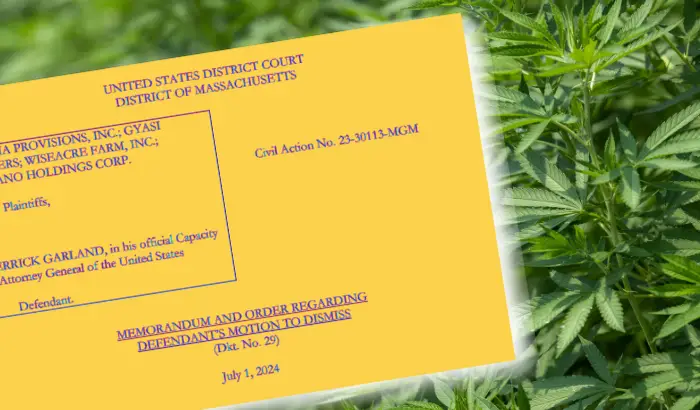
Plaintiffs included “independent operators in Massachusetts who have suffered significant harm and business challenges due to federal prohibition.”
Last October, a “coalition of U.S. cannabis operators and investors working in state-legal medical and adult-use cannabis markets filed a lawsuit against U.S. Attorney General Merrick Garland.”
Represented by the powerhouse firm Boies Schiller Flexner, the group sought “to enjoin the federal government from enforcing the Controlled Substances Act in a manner that interferes with the intrastate cultivation, manufacture, possession, and distribution of cannabis, pursuant to state law.”
Basically, the suit asserted that “the federal government has no basis for enforcing the Controlled Substances Act against intrastate, state-regulated cannabis operations.”
And for those in the commonwealth, there was a local angle, with the lawsuit filed in the United States District Court for the District of Massachusetts, Western Division. With plaintiffs including Gyasi Sellers (CEO and Founder of Treevit), Canna Provisions, and Wiseacre Farm, “all of which are local independent operators in Massachusetts who have suffered significant harm and business challenges due to federal prohibition.”
Those small companies were joined in the suit by the publicly traded Verano Holdings, with additional “foundational support” from Ascend Wellness Holdings, TerrAscend, and Green Thumb Industries, “as well as Eminence Capital and Poseidon Investment Management.”
It was a hail mary, even symbolic in some respects, but a valiant effort nonetheless. And on Monday, a district court judge granted the defendant, aka the attorney general of the United States, his motion to dismiss. As the July 1 memorandum explains:
Almost twenty years ago, the Supreme Court declined to find that the reach of the Controlled Substances Act … exceeded the bounds of federal authority when applied to non commercial, wholly-intrastate activities involving small-scale cultivation and possession of marijuana for personal medical use.Gonzalez v. Raich (2005). The plaintiffs had argued that Congress lacked authority under the Commerce Clause To criminalize the cultivation and possession of marijuana that never enters the stream of commerce and is consumed in compliance with state law and pursuant to a physician’s prescription.
“Despite acknowledging ‘the troubling facts’ of the case, the Court wrote that ‘[o]ur case law firmly establishes Congress’ power to regulate purely local activities that are part of an economic class of activities that have a substantial effect on interstate commerce.’” More from the court below:
Plaintiffs, four owners of marijuana businesses that operate in Massachusetts and incompliance with state law, have asked this court to reach a different conclusion about the limits the Commerce Clause imposes on Congressional authority. Plaintiffs support their position by detailing the extent of changed views about marijuana, state regulation, and federal enforcement since the Supreme Court decided Raich. While the Complaint has alleged persuasive reasons for a reexamination of the way the Controlled SubstancesAct (“CSA”) regulates marijuana, the relief sought is inconsistent with binding Supreme Court precedent and, therefore, beyond the authority of this court to grant.
It’s not all bad news. In allowing the motion to dismiss, the judge also wrote: “Finally, and as the Supreme Court noted in Raich, the absence of judicial relief from this court does not leave Plaintiffs without another avenue of relief.’ … Plaintiffs can pursue their claims and seek the attention of the Supreme Court. They also are free to advocate for marijuana to be reclassified or removed from the CSA.”
And we have no doubt they will do that. To be continued …
























